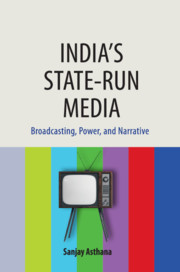Book contents
- Frontmatter
- Dedication
- Contents
- List of Figures and Tables
- Acknowledgements
- Introduction
- 1 Broadcasting, Spatiotemporalities, and Power
- 2 Doordarshan, Literary Drama, and Narrative Identity
- 3 Televisual Representations of Socio-Spatial Conflicts, and the Religious–Secular Imaginaries
- 4 Patriotism and Its Avatars: Tracking the National–Global Dialectic in Music Videos and Television Commercials
- 5 Remembering Doordarshan: Figurations of Memories and Nostalgia on Blogs, YouTube, and in Oral Interviews
- Epilogue
- Bibliography
- Index
Epilogue
Published online by Cambridge University Press: 08 May 2019
- Frontmatter
- Dedication
- Contents
- List of Figures and Tables
- Acknowledgements
- Introduction
- 1 Broadcasting, Spatiotemporalities, and Power
- 2 Doordarshan, Literary Drama, and Narrative Identity
- 3 Televisual Representations of Socio-Spatial Conflicts, and the Religious–Secular Imaginaries
- 4 Patriotism and Its Avatars: Tracking the National–Global Dialectic in Music Videos and Television Commercials
- 5 Remembering Doordarshan: Figurations of Memories and Nostalgia on Blogs, YouTube, and in Oral Interviews
- Epilogue
- Bibliography
- Index
Summary
This book explored the history and development of broadcasting in late colonial and postcolonial India through an examination of the intertwined genealogies of sovereignty, public, religion, and nation, and the spatiotemporal dynamics of radio and television. The colonial constructions of sovereignty, public, religion, and nation that underpinned the formative period of broadcasting continued to operate in the postcolonial careers of radio and television largely shaping the structural, institutional, and policy discourse. While the study of broadcasting's administrative structures and bureaucratic forms revealed particular configurations and power modalities, analyses of television's programme narratives and viewers’ reception context pointed to incommensurability between the concepts and their explanations of sociocultural practices, with religion and the public in particular, as the most problematic. I argued that scholarly studies of India's state-run television glossed over the religious, the particular interplay between religion and secularism, and have not paid attention to how the colonial construction of broadcast public and the public– audience dialectic.
To overcome the incommensurability—and the conceptual conundrums — posed by colonial constructs, specifically religion and the public, I developed a theoretical approach drawing on Ricoeur's formulation of the ‘double hermeneutic’ and Foucault's late work on the ‘hermeneutics of the self’. The analytic orientation enabled me to pursue concrete examination of modes of power and narrative dimensions that underpinned sovereignty, public, religion, and nation; more crucially, however, the heterodox theoretical approach opened up the possibility of exploring divergent meanings of religion and the public that existed in late colonial and postcolonial India, and the particular ways in which these operated in television narratives—at the aesthetic, cultural, and symbolic levels, in stories, plots, events, kinship relations, characters, and the life-worlds.
Instead of summarizing the chapters, I offer commentary on the Eurocentric/Western conceptions of history, modernity, and religion, especially since the presence of the universal categories in contemporary India continue to obfuscate, rather than illuminate and clarify historical, social, and cultural processes. In the following, I briefly explore some recent scholarship in television studies in India as well as the West, pointing to their possibilities and problems in reconceptualizing media and communication studies (MCS) in India. Next, I draw on few scholarly writings in philosophy, neo-Marxist critiques, postcolonial, South Asian, and religious studies that present strategies on how to engage and move beyond the Eurocentric/Western universals.
- Type
- Chapter
- Information
- India's State-run MediaBroadcasting, Power, and Narrative, pp. 159 - 176Publisher: Cambridge University PressPrint publication year: 2019



